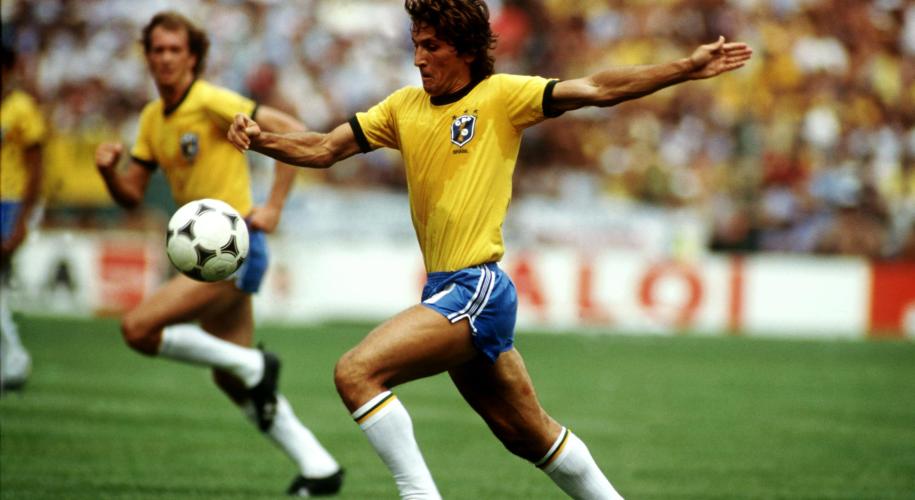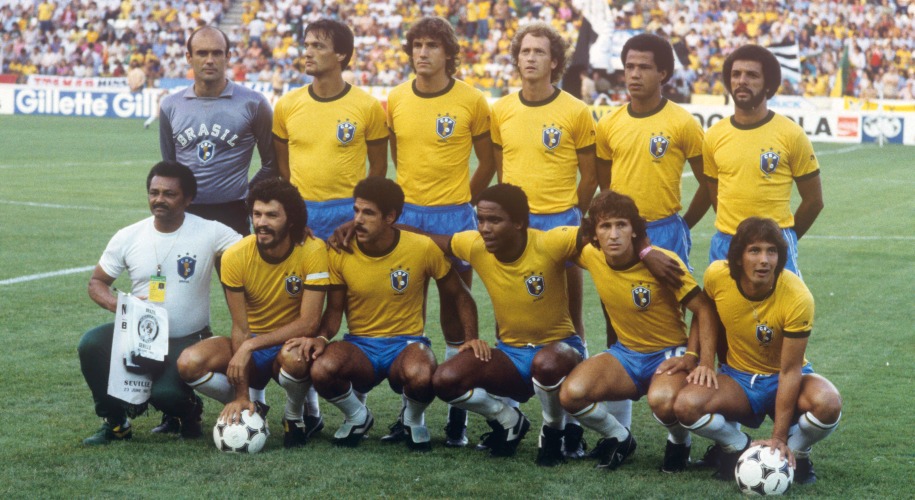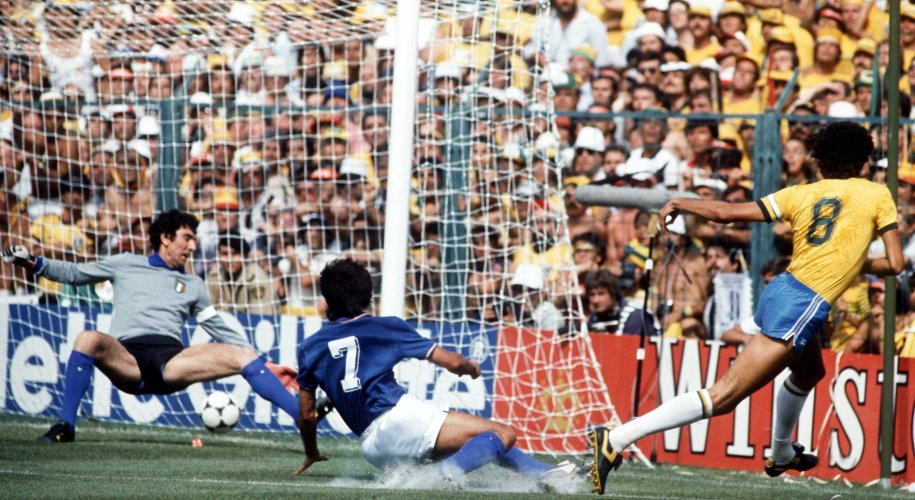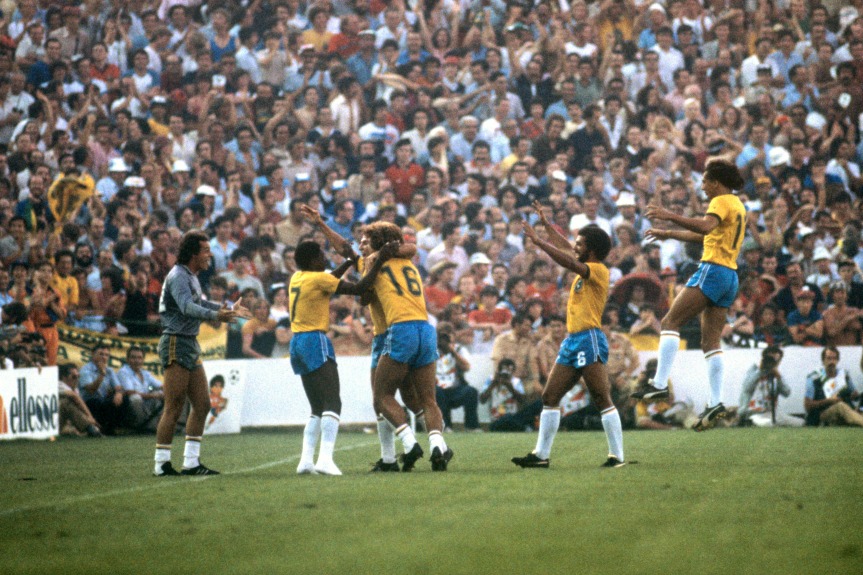SINCE JUNE 21 1970, football fans have been longing for Brazil to gift the world the spirit of samba, the ball-juggling artistry that encapsulated jogo bonita, the romantic, natural brilliance that delivers entertainment and excitement. Brazil’s 1970 World Cup winners did not represent the start of something, that team was actually the culmination of a process that began amid the despair or Rio 1950. By the time the next World Cup came along, Brazil’s 1970 troubadours had mostly gone, with just Piazza, Jairzinho and Rivelino left from the all-star XI.
Maybe it was the heat and altitude of Mexico, or perhaps 1970 was a bookend for the crazy and experimental 1960s, but Brazil struggled to replicate the mood of the time. In 1974 and 1978, people were disappointed by Brazil, a team that had tried, in vain, to ape European methods in order to present a tougher image to the world. Whatever they were up to, it didn’t work, for Brazil were just plain dull in two World Cups, unable to live up to their billing.
Background
In truth, so many times this has characterised Brazil in the last 50 years. There have been only rare glimpses of the Copacabana attitude in 12 World Cups, but in one of them, 1982, Brazil sent a team out to play and entertain and should perhaps have lifted the World Cup instead of Italy. As it happened, Brazil 1982 merely became another of those “people’s favourites” who fell short of true greatness but whose legend has grown stronger with the decades. This team joined a club that includes Austria 1934, Hungary 1954, Portugal 1966 and Netherlands 1974.
Brazil, as a country, was under military rule from 1964 to the early 1980s, but the regime gradually fell apart and by 1982, Brazil was in financial chaos and had defaulted on its debt, triggering a downturn across South America. Football provided very little as a distraction, but in 1980, Telê Santana was appointed as head coach of the national team, a man who believed in the traditional Brazilian approach to football.
History is extremely kind to Santana, largely because he restored some belief in the popular view of Brazil as a footballing version of the Haarlem Globetrotters. Not everyone appreciated his style, though, or his stubbornly strict nature. When he took over in 1980s as Brazil’s coach, there was an uncomfortable acclimatisation period that saw him receive jeers from the crowd.
Argentina had won the 1978 World Cup and they had a new star in Diego Maradona. While the world was getting fascinated with the Buenos Aires street footballer, Brazil were preparing for the 1982 World Cup, to be held in Spain. Brazil had unveiled their “white Pelé” in 1978, Zico, but he had disappointed in Argentina and was either off his game or injured. Brazil were always uncovering the “new Pelé” but invariably it didn’t work out that way. Zico had the touches, but in a workmanlike Brazil team, he couldn’t shine.

Team
The World Cup qualifying competition was easily handled by Santana’s team, four straight wins against Venezuela and Bolivia, 11 goals scored, one conceded. It was the summer tour of 1981 that really acted as a curtain-raiser for Spain 1982 and the impressive results prompted the media to pronounce Brazil as favourites for the World Cup. Brazil played four games, against England, France, West Germany and Spain – all of whom would appear in World Cup 1982.
In the build-up to virtually every World Cup, the state of Brazil’s team would be the source of great speculation. There was often a degree of kidology involved in order to temper expectation, but as 1981 became 1982, people were talking about the current seleçâo as the best since the days of Pelé.
The squad for Spain included two players who had featured in 1974, goalkeeper Peres and midfielder Dirceu. Zico was 25 when he became known to the world in 1978 and Cerezo and Oscar had also featured in the squad for Argentina. The public image of the squad was that it was harmonious and “together”, but apparently, there was some friction between the players of Atlético Mineiro and Flamengo. This may have been triggered by the 1981 Copa Libertadores meetings between the two clubs, which both ended in 2-2 draws. A play-off followed and Atlético had five men sent off. Flamengo went on to win the competition, the only time they have lifted South America’s premier club competition.
The Brazilian squad was evenly spread across Brazilian football, with Flamengo providing three key players: Zico, Leandro and Júnior. Zico had been named South American Footballer of the Year in 1981, pushing the 1979 and 1980 winner Maradona into second position. While the Argentinian had been getting the headlines and Zico was still relatively unknown outside his native Brazil, the 1982 World Cup was seen as the theatre to provide affirmation for both players. With Zico 29 years old, it was arguably his last chance to impress the global audience.
Brazil’s captain, and to a large degree, the face of 1982, was not Zico, though. That honour fell to Socrates, a heavy smoker, a drinker and a bedraggled, messianic figure. Socrates was political, outspoken and the most unlikely looking footballer. But his presence and his ability epitomised the team of 1982. He played for Corinthians and specialised in delicate back-heels, as well as political statements, including the time he told the people of Brazil that he would never leave the country to play football elsewhere if the government implemented free elections. They didn’t and he left, somewhat reluctantly, to play for Fiorentina.
Zico and Socrates formed part of a midfield quartet that looked las though it was playing for fun. They passed the ball with a touch of fantasy in their boots, finding space and men with accuracy and invention. Falcão was 27 at the time and playing in Italy with Roma. He was a deep-lying playmaker with the ability to score spectacular long-range goals. Complementing Falcão was the workhorse of the midfield, the wafer-thin and lanky Toninho Cerezo of Atlético Mineiro.
Not for the first time in history, Brazil’s team of supreme talents had its soft underbelly. On this occasion it was the goalkeeper, Waldir Peres, who had been included in World Cup squads since 1974. Peres was much-maligned, mostly because of an early mistake in the World Cup when he allowed the USSR to take the lead in Brazil’s opening match. The Brazil side of 1970 was also said to have a weak keeper, but like his predecessors, Peres didn’t let too many goals. Similarly, Brazil 1982 had a less celebrated centre forward in the muscular and one-dimensional Serginho, who still managed to score twice in the competition.
The people of Brazil loved the 1982 team because it revived memories of the fluid, creative style of the past, the approach that had won three World Cups between 1958 and 1970. It included the best player from the main football states: Minas Gerais (Cerezo), Rio Grande do Sul (Isidoro), Rio de Janeiro (Zico) and São Paulo (Socrates). In many ways, it was a team for one tournament, though. Zico was 29, Socrates, Falcão and Serginho 28, Cerezo, Oscar and Luzinho 27.

Spain
Brazil began the group stage with a 2-1 victory against the Soviets, who had taken the lead thanks to a slip-up by Peres. If that confirmed the pre-competition analysis of Brazil’s weak spots, the two goals that turned the game around rubber-stamped the team as being packed with star quality, the strikes from Socrates and Éder both spectacular efforts.
Outstanding goals became a feature of Brazil’s 1982 campaign, if they were not great finishes, they were well crafted. Scotland took the lead against Santana’s men but were made to pay, with wonderful efforts from Zico, Éder and Falcão. New Zealand were also beaten by four, with Zico running riot.
The next stage saw Brazil in what everyone popularly called “the group of death”, including an out-of-sorts Argentina who were still preoccupied with the Falklands War and the over-expectation around Maradona, who was looking to move to Europe after the World Cup. And then there was Italy, who had laboured, uninspiringly, through their group with draws against Poland, Peru and Cameroon.
Brazil had charmed their way through the competition, along with a French side that had overcome a defeat in their first game and included the gifted Michel Platini. If football was to be the winner, the final should have been between these two countries.
Brazil beat a fractious Argentina 3-1, a game that ended with Maradona receiving a red card for a foolish attack on Batista. Argentina had already been beaten 2-1 by Italy, so they were out and this meant a draw would be enough for Brazil to reach the semi-finals, and they were favourites.
Italy, however, had a secret weapon simmering away in Paolo Rossi, the 25 year-old Juventus striker who had only just returned from a two-year ban due to his involvement in the Totonero betting scandal. Rossi, like Italy, had failed to make an impact in the first group stage. Against Argentina, he was subbed for the second time in the competition with 10 minutes to go. Rossi’s ability prior to his ban was unquestioned, but the decision to take him to Spain was controversial. Against Brazil, he would silence the critics and enjoy his finest hour.
Rossi opened the scoring after five minutes, a header on the run from Cabrini’s cross to the far post. Socrates levelled on 12 minutes after a good interchange with Zico, but Rossi made it 2-1 after 25, capitalising on a defensive error by Cerezo. It took Brazil 43 minutes to equalise, Falcão netting with another outstanding goal. At this point, Brazil were through to the last four, but they continued to spurn pragmatism and go in pursuit of more goals. With 15 minutes to go, Marco Tardelli played the ball into the area and Rossi turned it home to put Italy ahead and complete his hat-trick. Brazil were behind, and on the brink of elimination. They pressed, they twisted and turned, but the Italian defence refused to yield and prevented their key man, Zico from playing his usual game. There was a sense of disbelief that the overwhelming favourites, the team that had restored faith in the Brazilian ethos of beautiful football, had been knocked out.

Death in Barcelona
Italy and Rossi went on to win the competition and Brazil went home, returning as heroes, despite blowing their chance of glory. An embittered Zico, who would also win South American Player of the Year in 1982, commented that “this was the day football died”.
In hindsight, it probably was the end of something special. Brazil’s traditional methods had been beaten by a resilient but unexceptional Italian side. Their last three European competitions had all ended in anti-climax – 1966 in England when Pelé vowed “never again; 1974 in West Germany when the Dutch made it clear, football had moved on; and now in Spain when an inferior team had deprived them of success.
By the time 1986 came around, Brazil still had some of the 82 squad, but they went out of the Mexico-hosted competition in the quarter-finals, and they were, after all, four years older. Desperate to win the World Cup again – each passing competition would provide a reminder, “it’s 20 years since…” – but questioning their own approach, they finally did it in 1994 in the US with a team that had very little in common with the heritage of the nation’s football. And unsatisfyingly, they did it on penalties after a dire game with old foes Italy.
The 1982 team really was the last flickers of the eternal flame that was lit as far back as the 1950s, when artistry and guile were staples of the Brazilian game. We still long to be stimulated by Brazilian skill, but we are ito often let down, even though footballers are made and nurtured in South America’s biggest nation. What is missing today is the spirit that gave us Garrincha, Pelé, Jairzinho, Ronaldo, Romario, Socrates, Falcão, Éder and Zico. Will it ever return?
@GameofthePeople
Photos: PA

